OBDwiz Automotive Diagnostic Software
Overview
Minimum Requirements
Key Features
Screenshots
Supported PIDs
Technical Support
Overview
OBDwiz is the automotive diagnostic software that is included with every ScanTool.net PC-based scan tool. It is a breeze to install, easy to use, and is packed with features. Use OBDwiz to troubleshoot a problem with your vehicle, improve fuel economy, clear the 'Check Engine' light, and verify emissions readiness. It is touchscreen-friendly, and can even be used as a digital dashboard.
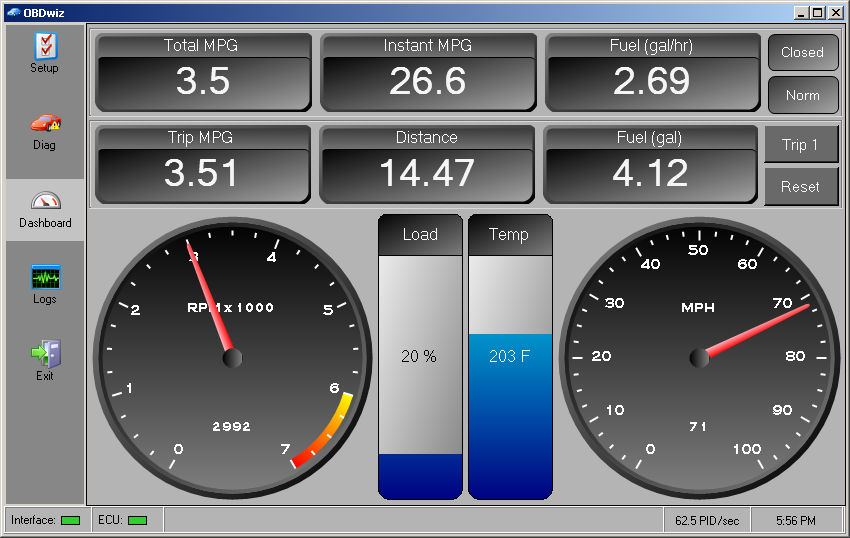
Minimum Requirements
OBDwiz is compatible with all PC-based scan tools sold on this website. It will run on any Windows Vista or newer computer, as long as it has the Microsoft .NET 2.0 Framework.
| Operating System | Windows Vista SP2, Windows 7, Windows 8, Windows 8.1, and Windows 10 (Windows XP not supported) |
| Screen Resolution | 640x480 or higher |
| OBD Interface | OBDLink MX Bluetooth, OBDLink LX Bluetooth, OBDLink MX Wi-Fi, or OBDLink SX |
Key Features
- Compatible with all PC-based scan tools sold on this website
- Supports all OBD-II compliant vehicles, including EOBD and JOBD vehicles
- Customizable dashboards
- Fuel economy MPG or km/l calculation
- Real-time dashboard display including multiple trip meters
- Real-time plotting of all PID values
- Recording and playback of monitored data
- Data logging to csv format
- Reading and clearing diagnostic trouble codes
- Display battery voltage
- Read freeze frame data
- Day-time and night-time display
- Create custom day- and night-time skins
- English and Metric units
- Statistical calculations including min, max, and mean values
- Over 90 supported PIDs
- Full control over polling rates and priorities
- Displays vehicle information including VIN number and calibration ID
- OBD console for sending commands directly to the vehicle
- Designed for single and multi-core processors
- Free unlimited updates*
* Updates are free and unlimited for all releases with the same major version number
Screenshots
When you first launch OBDwiz, it opens the Connection tab:
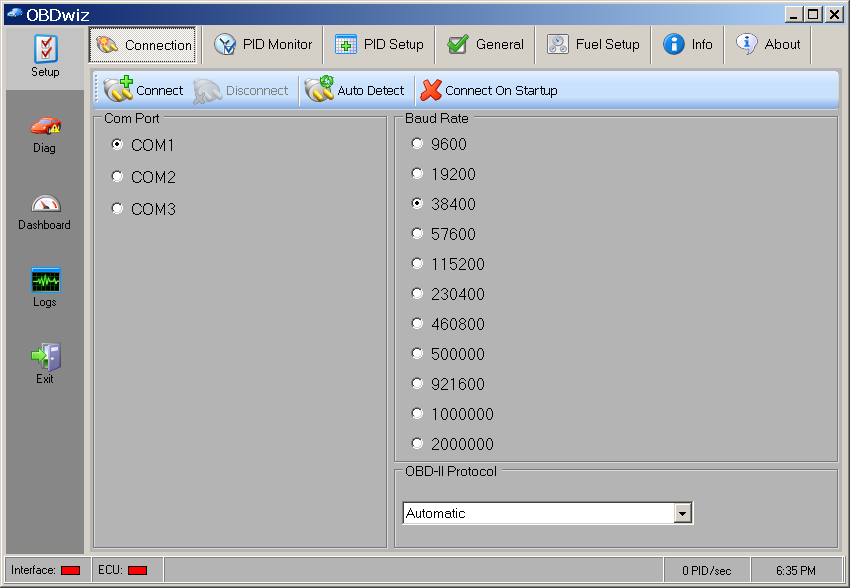
Select the COM port and baud rate for your scan tool, or click "Auto Detect" to have the software automatically find it:
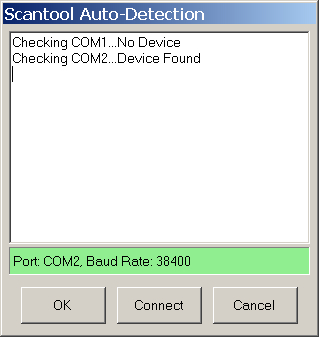
When you click "Connect", if the protocol is set to "Automatic" the software attempts to connect to the vehicle by sending a request on each OBD-II protocol, until the correct one is found:
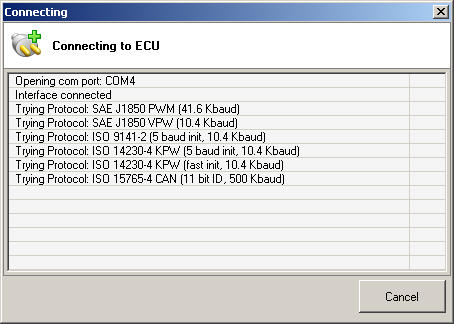
PID Monitor can be used to fine tune the performance of the software.
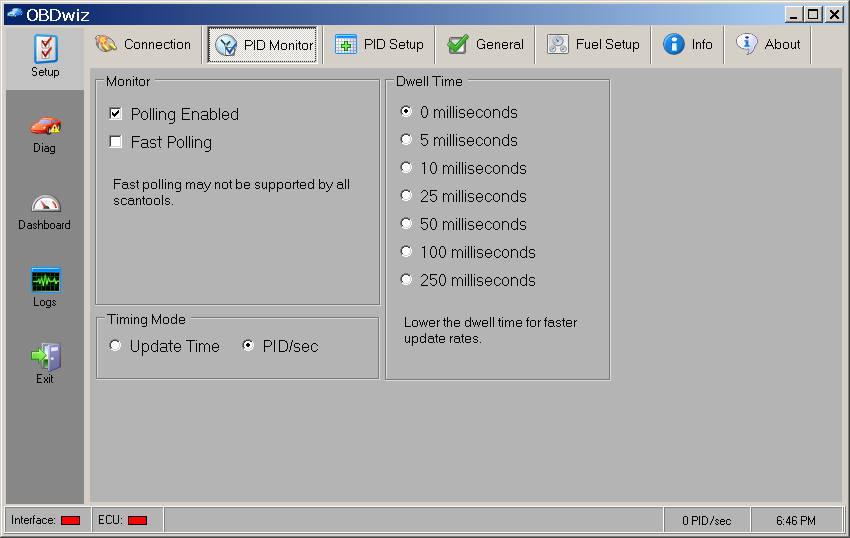
Once the connection is established, you can set up the real-time parameters you want to monitor, in PID Setup (PID stands for "Parameter ID").
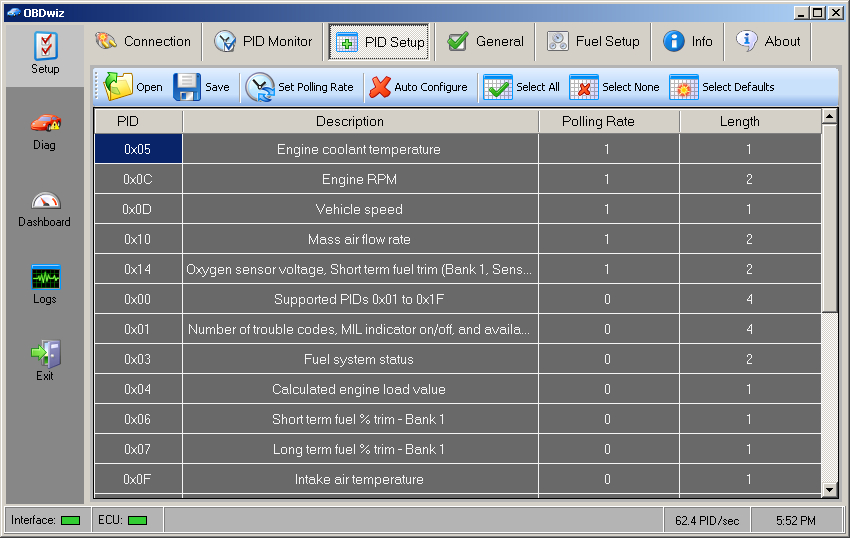
The General tab is used to switch between metric and English units, Day/Night modes, switch between and edit custom dashboards, and set other user preferences.
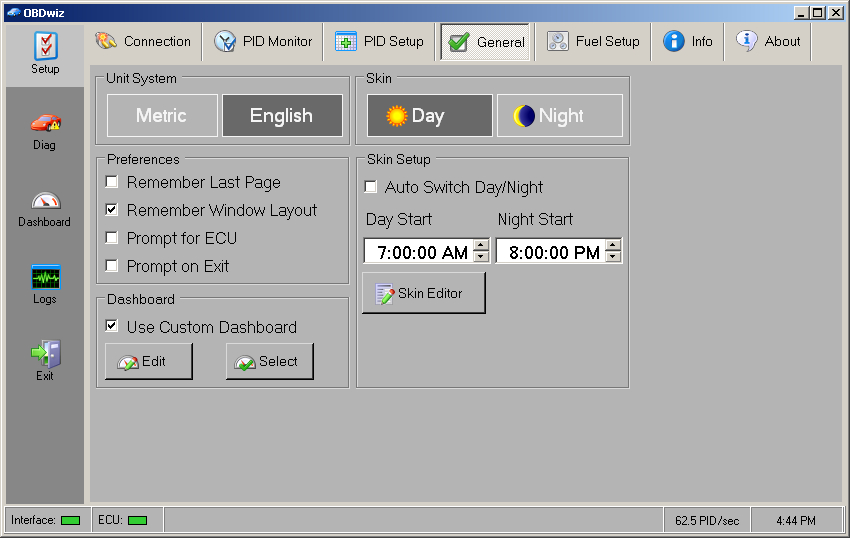
Configure the MPG or l/km meter parameters in the Fuel Setup tab.
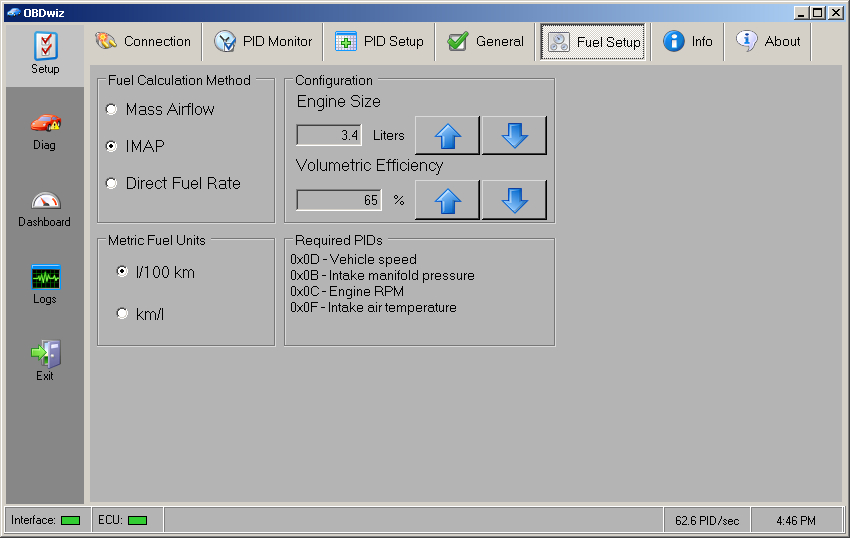
Info tab shows useful information about the scan tool and the vehicle.
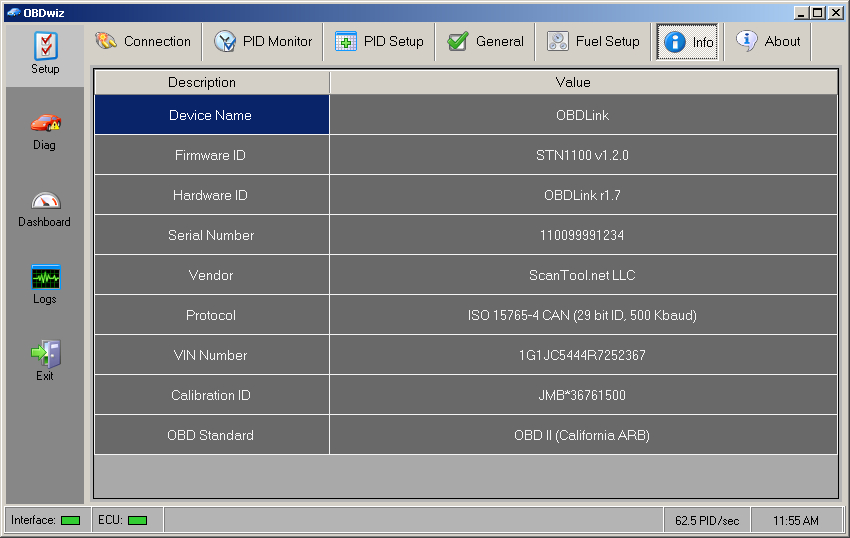
About contains the software version and copyright information.
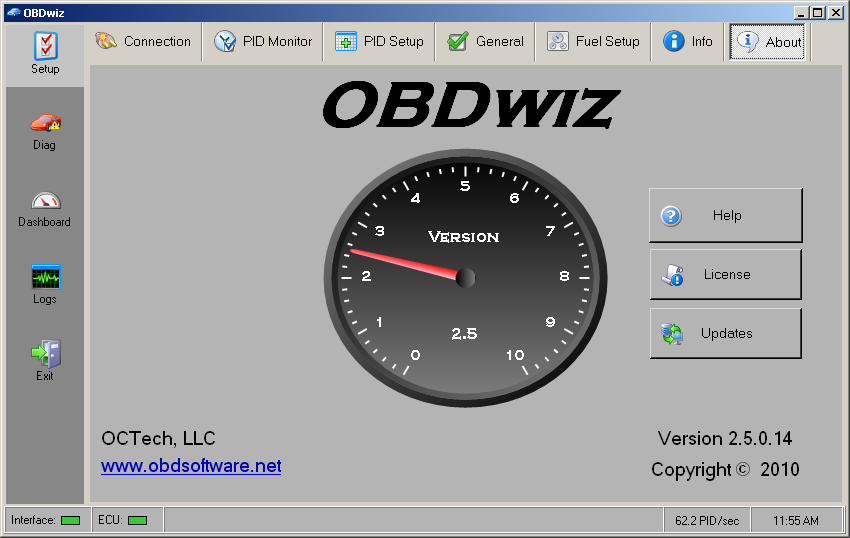
Trouble Codes tab displays any available stored, pending, or permanent DTCs (Diagnostic Trouble Codes). Click the "Clear Trouble Codes" button to erase the DTCs and other diagnostics-related information.
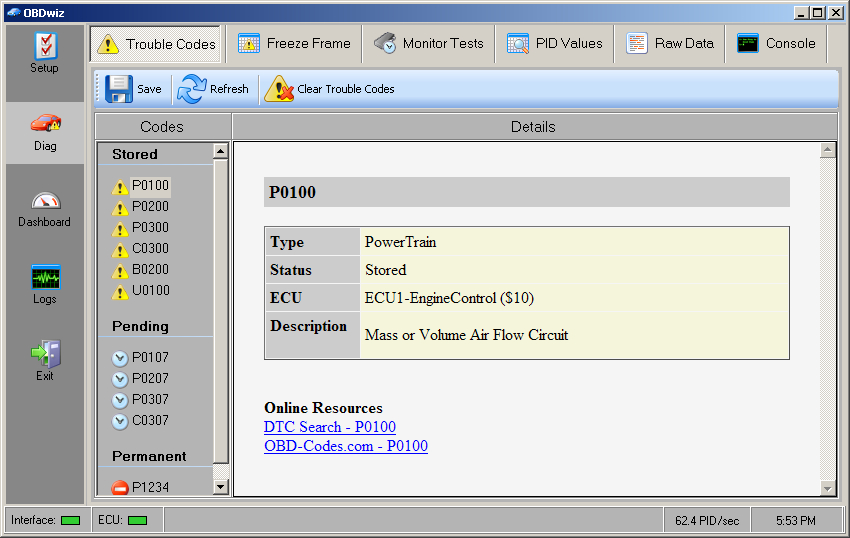
Freeze Frame shows a snapshot of vehicle parameters at the exact moment the DTC was set.
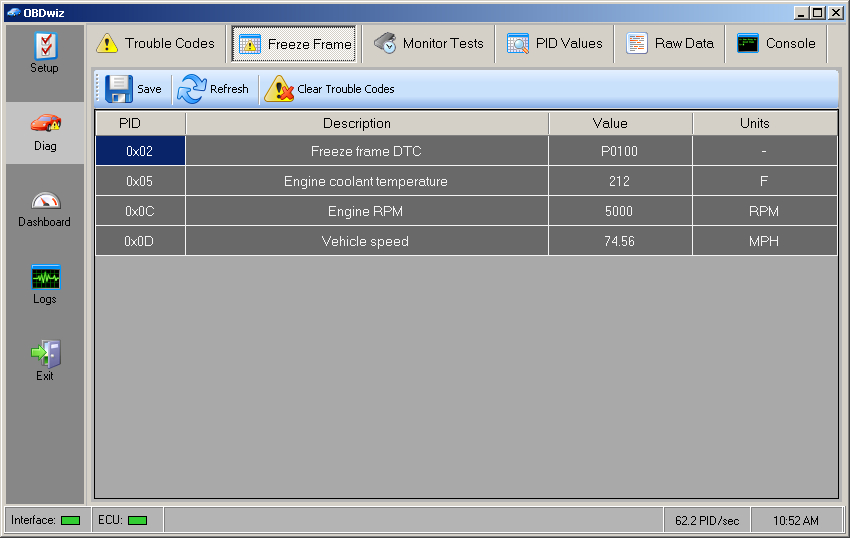
Monitor Tests shows the status of continuous and non-continuous monitors, as well as the MIL (Malfunction Indicator Light) status.
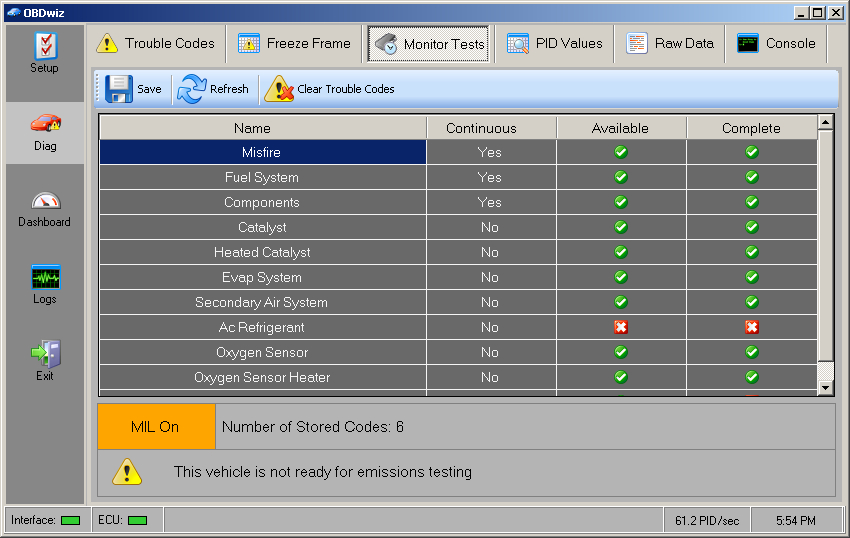
PID Values displays parameters in a simple table.
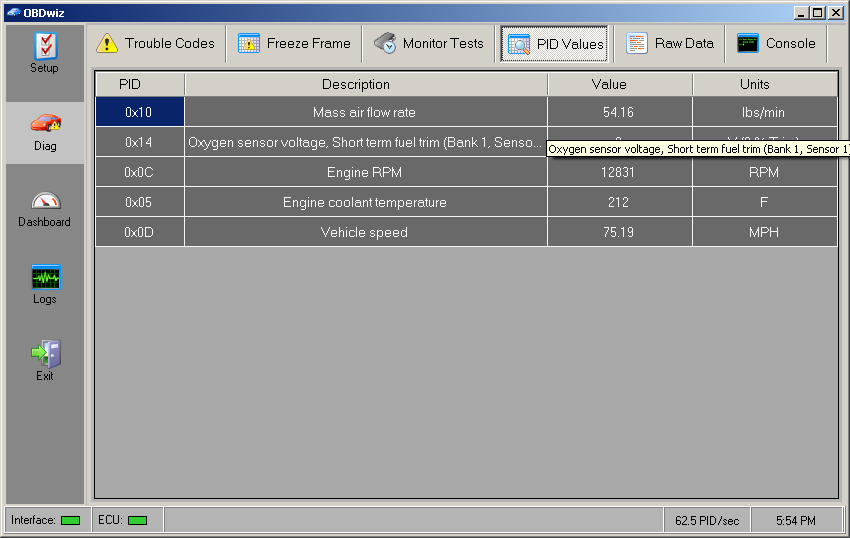
Console allows commands to be sent directly to the scan tool.
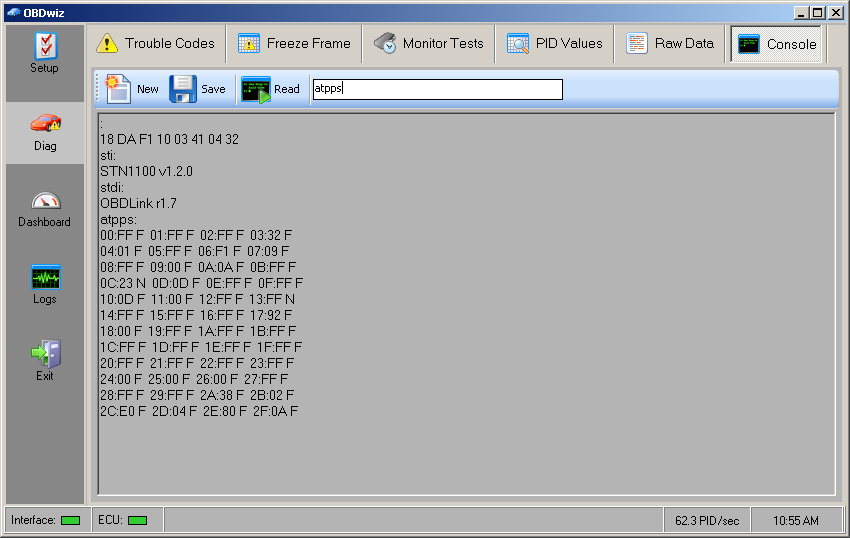
Default dashboard.

Same dashboard, "Night Mode":
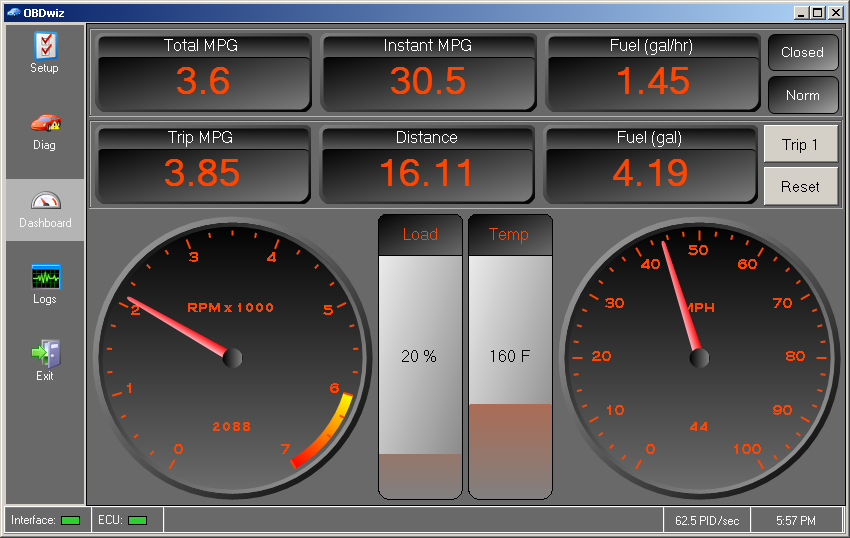
Custom dashboards:
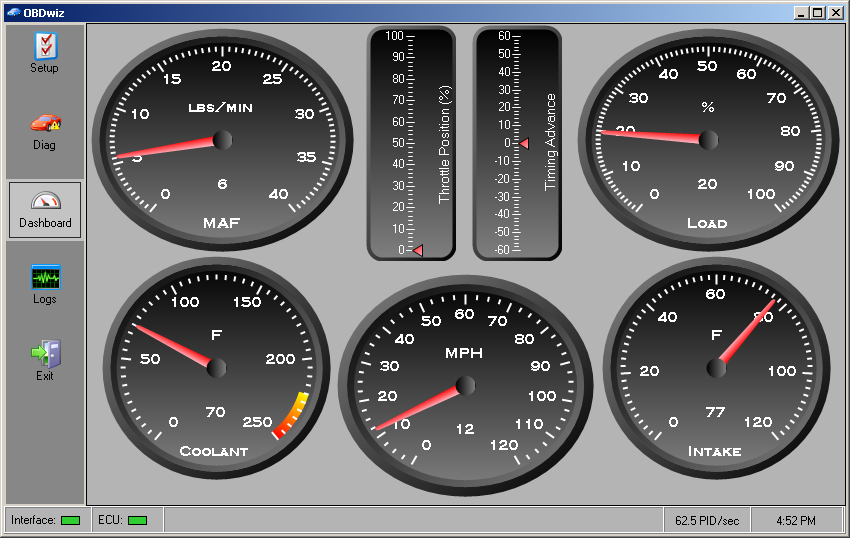
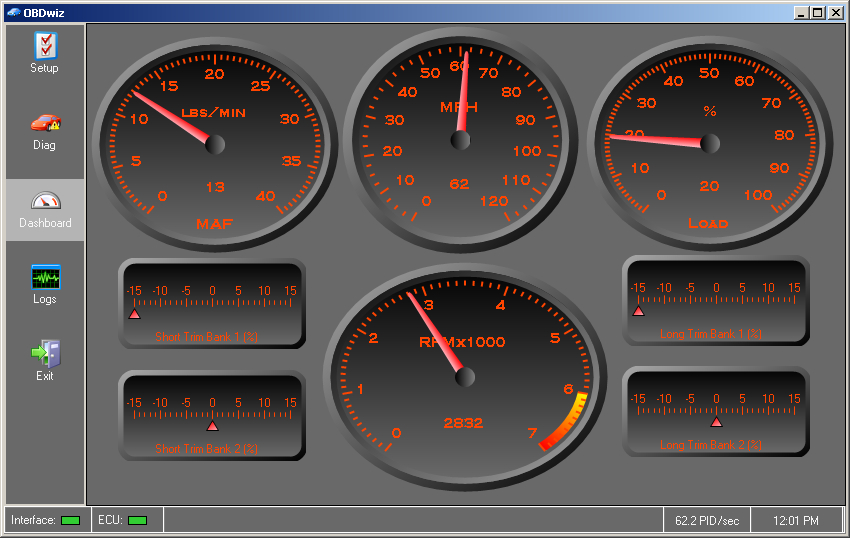
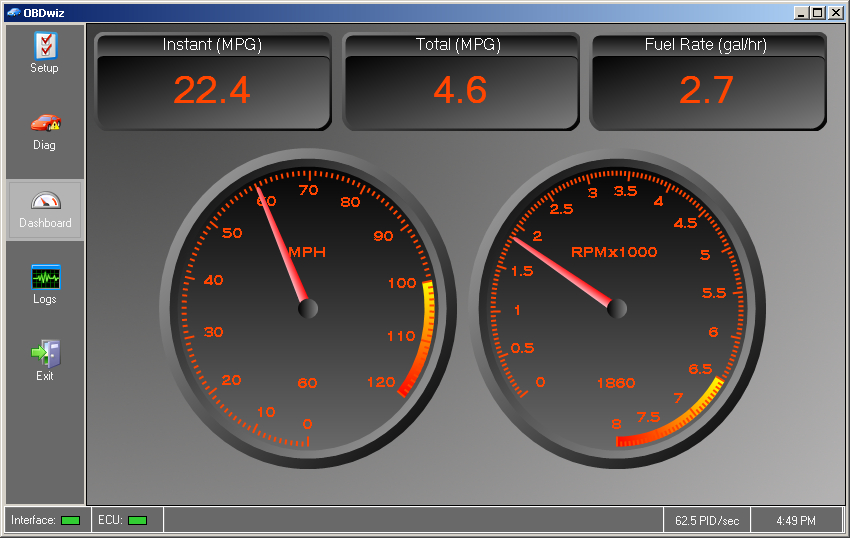
OBDwiz can plot a single or multiple engine parameters on the same screen...
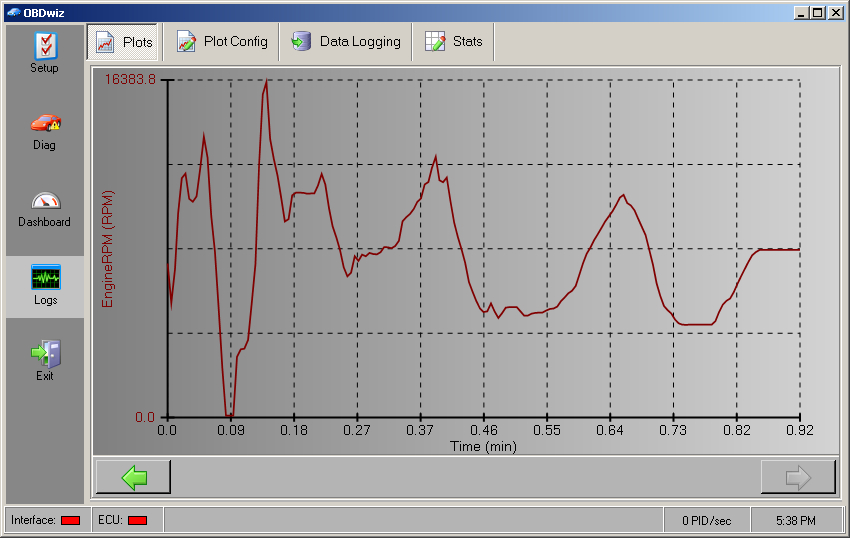
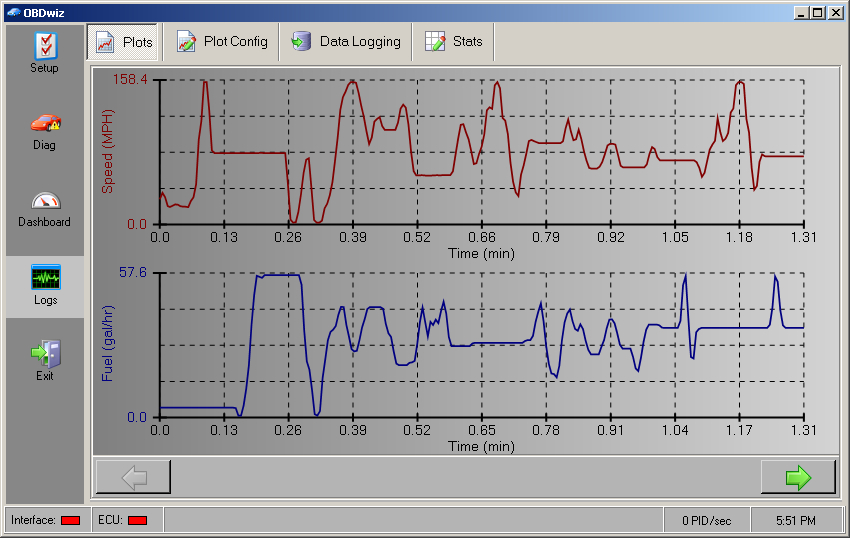
..or log them for later playback or import into a spreadsheet program.
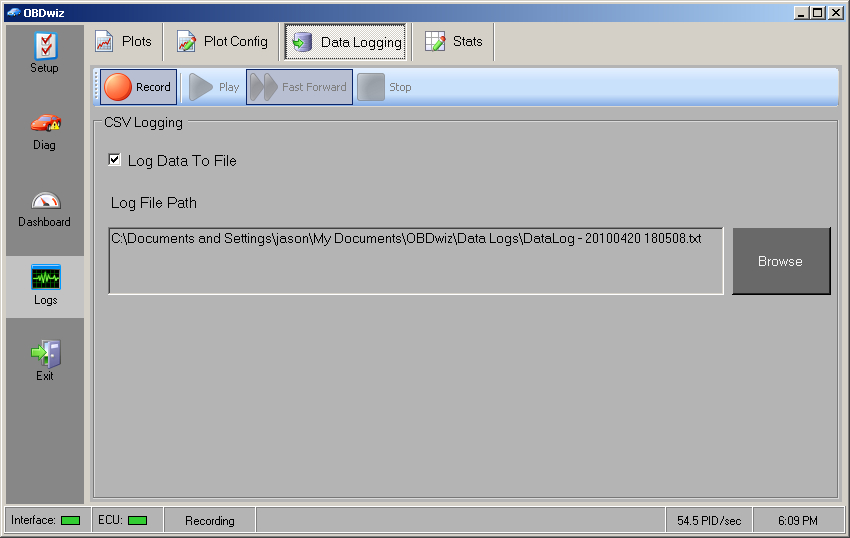
Stats screen shows various statistics for the selected parameters.
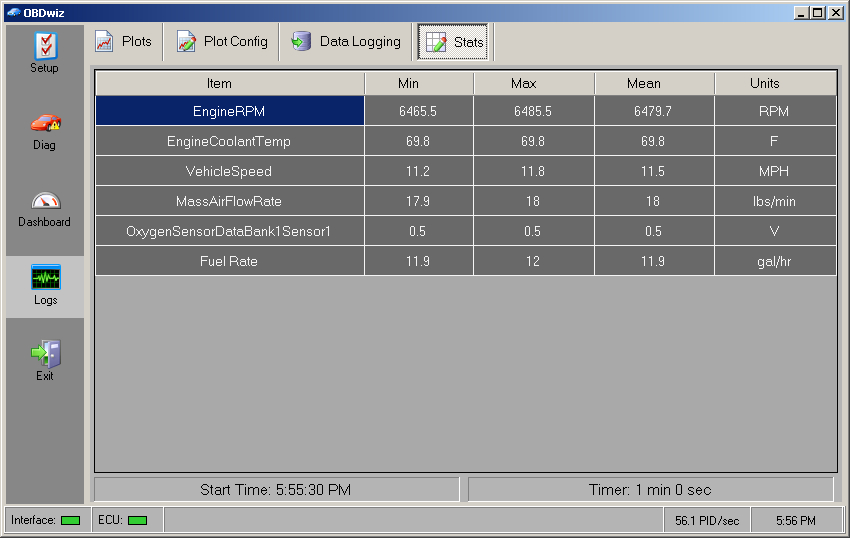
Supported PIDs
| PID | Description |
|---|---|
| 0x00 | Supported PIDs 0x01 to 0x1F |
| 0x01 | Number of trouble codes, MIL indicator on/off, and available onboard tests |
| 0x02 | Freeze frame DTC |
| 0x03 | Fuel system status |
| 0x04 | Calculated engine load value |
| 0x05 | Engine coolant temperature |
| 0x06 | Short term fuel % trim - Bank 1 |
| 0x07 | Long term fuel % trim - Bank 1 |
| 0x08 | Short term fuel % trim - Bank 2 |
| 0x09 | Long term fuel % trim - Bank 2 |
| 0x0A | Fuel pressure |
| 0x0B | Intake manifold pressure |
| 0x0C | Engine RPM |
| 0x0D | Vehicle speed |
| 0x0E | Timing advance |
| 0x0F | Intake air temperature |
| 0x10 | Mass air flow rate |
| 0x11 | Throttle position |
| 0x12 | Secondary air status |
| 0x13 | Oxygen sensors present |
| 0x14 | Oxygen sensor voltage, Short term fuel trim (Bank 1, Sensor 1) |
| 0x15 | Oxygen sensor voltage, Short term fuel trim (Bank 1, Sensor 2) |
| 0x16 | Oxygen sensor voltage, Short term fuel trim (Bank 1, Sensor 3) |
| 0x17 | Oxygen sensor voltage, Short term fuel trim (Bank 1, Sensor 4) |
| 0x18 | Oxygen sensor voltage, Short term fuel trim (Bank 2, Sensor 1) |
| 0x19 | Oxygen sensor voltage, Short term fuel trim (Bank 2, Sensor 2) |
| 0x1A | Oxygen sensor voltage, Short term fuel trim (Bank 2, Sensor 3) |
| 0x1B | Oxygen sensor voltage, Short term fuel trim (Bank 2, Sensor 4) |
| 0x1C | OBD standards this vehicle conforms to |
| 0x1D | Oxygen sensors present 2 |
| 0x1E | Auxiliary input status |
| 0x1F | Run time since engine start |
| 0x20 | Supported PIDs 0x21 to 0x3F |
| 0x21 | Distance traveled with malfunction indicator lamp (MIL) on |
| 0x22 | Fuel rail pressure (relative to manifold vacuum) |
| 0x23 | Fuel rail pressure (diesel) |
| 0x24 | Oxygen sensor 1 equivalence ratio (lambda value) |
| 0x25 | Oxygen sensor 2 equivalence ratio (lambda value) |
| 0x26 | Oxygen sensor 3 equivalence ratio (lambda value) |
| 0x27 | Oxygen sensor 4 equivalence ratio (lambda value) |
| 0x28 | Oxygen sensor 5 equivalence ratio (lambda value) |
| 0x29 | Oxygen sensor 6 equivalence ratio (lambda value) |
| 0x2A | Oxygen sensor 7 equivalence ratio (lambda value) |
| 0x2B | Oxygen sensor 8 equivalence ratio (lambda value) |
| 0x2C | Commanded EGR |
| 0x2D | EGR error |
| 0x2E | Commanded evaporative purge |
| 0x2F | Fuel level input |
| 0x30 | Number of warm-ups since codes cleared |
| 0x31 | Distance traveled since codes cleared |
| 0x32 | Evap system vapor pressure |
| 0x33 | Barometric pressure |
| 0x34 | Oxygen sensor 1 equivalence ratio (lambda value) |
| 0x35 | Oxygen sensor 2 equivalence ratio (lambda value) |
| 0x36 | Oxygen sensor 3 equivalence ratio (lambda value) |
| 0x37 | Oxygen sensor 4 equivalence ratio (lambda value) |
| 0x38 | Oxygen sensor 5 equivalence ratio (lambda value) |
| 0x39 | Oxygen sensor 6 equivalence ratio (lambda value) |
| 0x3A | Oxygen sensor 7 equivalence ratio (lambda value) |
| 0x3B | Oxygen sensor 8 equivalence ratio (lambda value) |
| 0x3C | Catalyst temperature (Bank 1 Sensor 1) |
| 0x3D | Catalyst temperature (Bank 2 Sensor 1) |
| 0x3E | Catalyst temperature (Bank 1 Sensor 2) |
| 0x3F | Catalyst temperature (Bank 2 Sensor 2) |
| 0x40 | Supported PIDs 0x41 to 0x5F |
| 0x41 | Monitor status this drive cycle |
| 0x42 | Control module voltage |
| 0x43 | Absolute load value |
| 0x44 | Command equivalence ratio |
| 0x45 | Relative throttle position |
| 0x46 | Ambient air temperature |
| 0x47 | Absolute throttle position B |
| 0x48 | Absolute throttle position C |
| 0x49 | Accelerator pedal position D |
| 0x4A | Accelerator pedal position E |
| 0x4B | Accelerator pedal position F |
| 0x4C | Commanded throttle actuator |
| 0x4D | Time run with MIL on |
| 0x4E | Time since trouble codes cleared |
| 0x4F | External test configuration #1 |
| 0x50 | External test configuration #2 |
| 0x51 | Fuel type |
| 0x52 | Percentage of alcohol fuel mix |
| 0x53 | Absolute evap system vapor pressure |
| 0x54 | Evap system vapor pressure |
| 0x55 | Short term secondary oxygen sensor trim bank 1 and bank 3 |
| 0x56 | Long term secondary oxygen sensor trim bank 1 and bank 3 |
| 0x57 | Short term secondary oxygen sensor trim bank 2 and bank 4 |
| 0x58 | Long term secondary oxygen sensor trim bank 2 and bank 4 |
| 0x59 | Fuel rail pressure (absolute) |
| 0x5A | Relative accelerator pedal position |
| 0x5B | Hybrid battery pack remaining life |
| 0x5C | Engine oil temperature |
| 0x5D | Fuel injection timing |
| 0x5E | Fuel rate |
| 0x5F | Emission requirements for this vehicle |
Technical Support
Visit OBDwiz forum board to ask questions and get support for this software.






